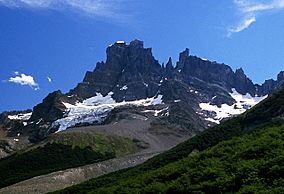Cerro Castillo National Park facts for kids
Quick facts for kids Cerro Castillo National Park |
|
|---|---|
|
IUCN Category II (National Park)
|
|
 |
|
| Location | Aysén del General Carlos Ibáñez del Campo Region, Chile |
| Nearest city | Balmaceda |
| Area | 1,795.5 km2 |
| Established | 1970 national reserve, 2018 national park |
| Governing body | Corporación Nacional Forestal |
Cerro Castillo National Park is a special nature reserve in Chile. It is located in the Aysén del General Carlos Ibáñez del Campo Region, which is in the southern part of the country. The park gets its name from Cerro Castillo, which means "Castle Hill." This mountain is the highest point and a main attraction in the park. A famous road called the Carretera Austral also runs through the park.
Contents
Park History
Cerro Castillo was first set aside as a national reserve in 1970. Later, in 2018, it became a full National Park. This change happened because of an agreement between the Chilean government and a group called Tompkins Conservation. This made the park even more protected.
Amazing Wildlife and Nature
Cerro Castillo National Park is home to many different animals and plants. It's a great place to see nature up close!
Animals of the Park
You can find several cool mammals here. One important animal is the South Andean deer, also known as the huemul. This deer is an endangered species, meaning it's at risk of disappearing. Other animals include guanacos, which are like small llamas, and pumas, which are wild cats. You might also spot a skunk called a Molina’s hog-nosed skunk, and wild dogs from the Lycalopex family.
The park is also a birdwatcher's paradise! Large birds like the Andean condor and black-chested buzzard eagles fly high in the mountains. Smaller birds like austral parakeets, thorn-tailed rayaditos, and Magellanic woodpeckers live in the forests.
Trees and Rivers
The most common trees in the park are lenga and ñirre. These trees are known for their beautiful autumn colors. You can also find evergreen trees, which stay green all year.
The park also has important rivers. Water from the northern part of the park flows into the Aisén River. Water from the southern part flows into the Ibáñez River. These rivers are important for the park's ecosystem.
Helping the Huemul Deer
Cerro Castillo National Park is a very important place for helping the huemul. There's a big project called the National Huemul Corridor. This project aims to help the huemul population grow again. They do this by creating "wildlife corridors." These are safe paths that allow animals to move freely between different protected areas. This helps them find food and mates, and keeps their populations healthy. Groups like Rewilding Chile and CONAF are working together on this project.
See also
 In Spanish: Parque nacional Cerro Castillo para niños
In Spanish: Parque nacional Cerro Castillo para niños
 | Lonnie Johnson |
 | Granville Woods |
 | Lewis Howard Latimer |
 | James West |

